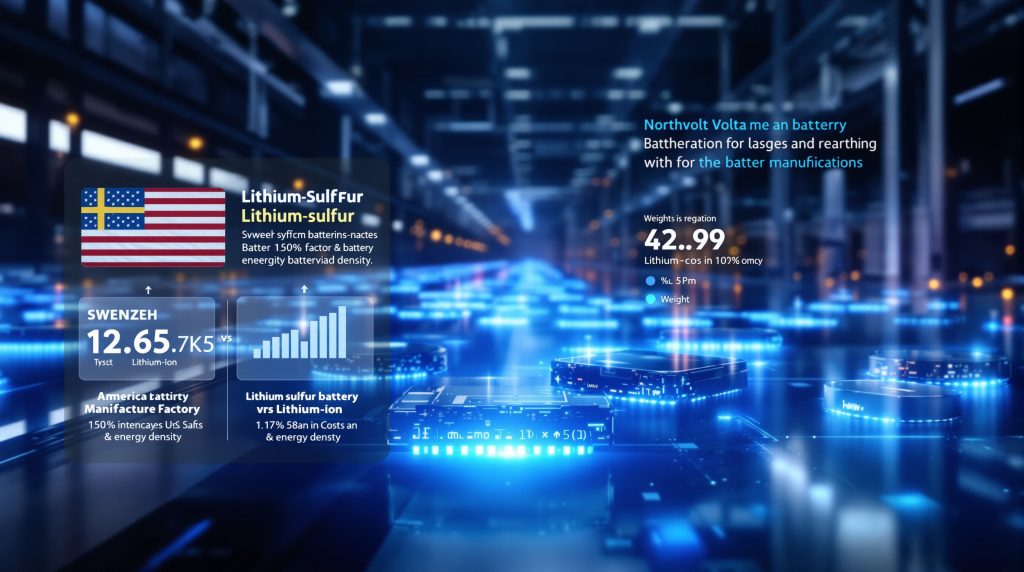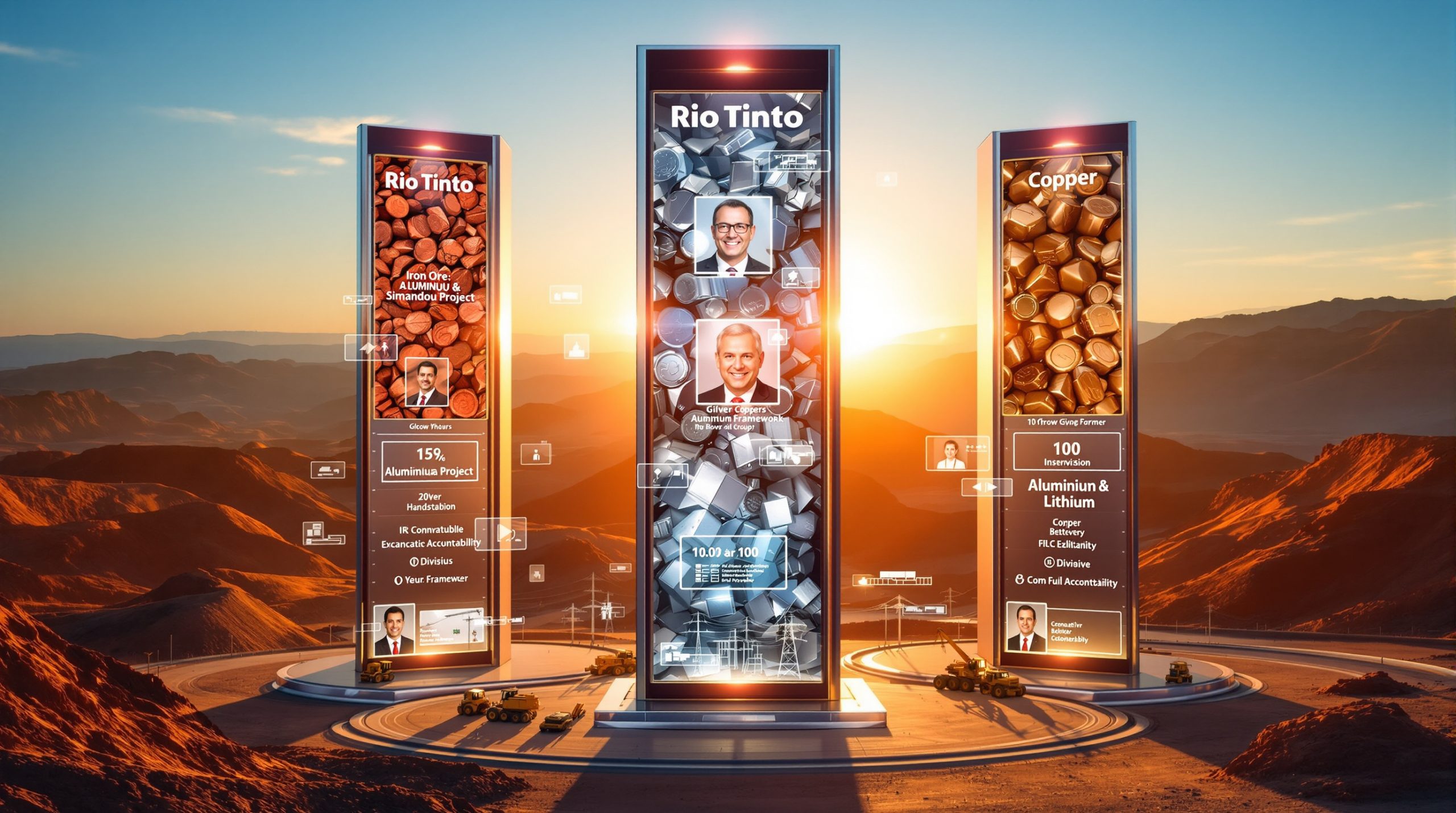Battery Startup Lyten's Bid to Revive Northvolt: Challenges and Opportunities
What is Lyten and Why is Their Northvolt Acquisition Significant?
Lyten, a Silicon Valley startup focused on lithium-sulfur battery technology, made headlines on August 7, 2025, with its strategic acquisition of bankrupt Swedish battery maker Northvolt's assets. This unexpected move positions Lyten to potentially become a European battery manufacturing champion, addressing the region's strategic goal of reducing dependency on Chinese battery suppliers.
The acquisition marks a critical turning point in Europe's battery industry development, particularly following Northvolt's dramatic collapse earlier in 2025, which left the company with $8 billion in debt. For Lyten, the deal represents an accelerated pathway to scaled production capabilities, while for Europe, it reignites hope for establishing a competitive domestic battery supply chain amid ongoing lithium refinery developments.
Stellantis currently holds a 2% stake in Lyten since their partnership began in 2023, originally formed to explore applications of Lyten's lithium-sulfur technology across various automotive components. This existing relationship provides Lyten with a potential customer base, though any supply deals will ultimately depend on technical validation and successful industrial scale-up.
Industry analysts expressed surprise at the acquisition, with James Frith of battery-tech focused venture capital firm Volta Energy Technologies noting that "Lyten was not previously associated with lithium-ion manufacturing" before the announcement. This sentiment underscores the bold nature of Lyten's strategic pivot.
How Does Lyten's Technology Compare to Traditional Battery Solutions?
Lithium-Sulfur vs. Lithium-Ion: A Comparative Analysis
| Feature | Lithium-Sulfur Batteries | Traditional Lithium-Ion Batteries |
|---|---|---|
| Weight | Significantly lighter | Heavier |
| Cost | Potentially lower production costs | Established but higher material costs |
| Critical Minerals | Reduced dependence on cobalt, nickel | Heavy reliance on critical minerals |
| Energy Density | Higher theoretical energy density (500+ Wh/kg) | Lower energy density (250-300 Wh/kg) |
| Commercial Readiness | Still in development phase | Mature technology |
| Manufacturing Complexity | New manufacturing challenges | Well-established processes |
| Cycle Life | Currently limited | Superior durability |
| Safety | Potentially improved | Well-documented safety profile |
Lyten's lithium-sulfur technology offers several compelling advantages over conventional lithium-ion batteries that currently dominate the EV market. The most significant benefits include substantially reduced weight, potentially lower manufacturing costs, and decreased reliance on critical minerals that are often sourced from China or conflict regions.
The theoretical energy density of lithium-sulfur batteries exceeds 500 Wh/kg, significantly outperforming current lithium-ion technologies that typically achieve 250-300 Wh/kg. This higher energy density translates to potentially longer EV ranges or smaller, lighter battery packs.
However, the technology still faces considerable challenges, particularly regarding cycle life stability and manufacturing scalability. While lithium-ion batteries benefit from decades of refinement and established production methods, lithium-sulfur remains in its relative infancy as a commercial technology.
The key technical hurdle for lithium-sulfur batteries involves managing the "shuttle effect," where soluble polysulfides form during discharge and migrate between electrodes, causing capacity loss and shortened battery life. Lyten claims to have made significant progress in addressing this challenge through proprietary materials engineering approaches, similar to recent advances in battery recycling breakthrough technologies.
What Challenges Does Lyten Face in Reviving Northvolt's Operations?
Rebuilding Customer Confidence
Lyten faces significant challenges in convincing automakers to commit to its technology after many were burned by the Northvolt experience. The company has effectively inherited a trust deficit that will require concrete demonstration of manufacturing capabilities and consistent quality control.
Major European automakers have expressed notable caution about placing new orders:
-
BMW, which previously canceled a €2 billion order with Northvolt due to quality issues, indicated they would only consider Lyten for "future battery cell projects" with a "long lead time"
-
Scania, a former Northvolt backer, stated it was "too early to discuss ordering cells"
-
Volvo Cars, which had partnered with Northvolt through its battery unit Novo Energy, declined to comment on potential orders
Even Stellantis, despite holding a 2% stake in Lyten since 2023, emphasized that any supply deals would depend on technical validation, industrial scale-up, and favorable commercial terms. This cautious approach reflects the broader industry sentiment following Northvolt's collapse.
A battery scientist at another European automaker revealed that their company had backed away from working with Lyten six months before the acquisition because Lyten was only producing at R&D scale. This highlights the critical importance of demonstrating manufacturing capabilities at commercial volumes.
Financial Hurdles and Production Scaling
While Lyten acquired Northvolt's assets at what it described as a "substantial discount," the company still faces formidable financial challenges:
- Need for substantial additional funding to restart and scale production
- Loss of Northvolt's previous $50 billion order book
- Requirement to prove manufacturing capabilities at scale
- Competition from established battery manufacturers with mature technologies
- Bridging the "valley of death" period of unprofitable production
Lyten CEO Dan Cook has indicated the company plans further large capital raises and aims to tap European grant programs, including the EU's battery booster package. Cook noted that Lyten has "a strong investor base including money managers and high-net-worth individuals," which expanded following the Northvolt transaction.
The company will need to demonstrate not only technical viability but also commercial sustainability to attract the significant capital required to compete with established Asian battery manufacturers who benefit from economies of scale, government support, and decades of manufacturing experience. These considerations are increasingly important in the evolving battery metals investment landscape.
When Can We Expect Lyten's Technology to Reach Commercial Scale?
Timeline for Lithium-Sulfur Development
Lyten has accelerated its timeline for large-scale lithium-sulfur EV battery cell production from the end of the decade to 2028, a direct result of acquiring Northvolt's production and R&D facilities. However, industry experts remain skeptical, cautioning that lithium-sulfur technology is unlikely to be viable for commercial vehicles before 2030.
The company currently produces lithium-sulfur cells at a pilot plant in Silicon Valley but faces the significant challenge of scaling this production to meet automotive industry demands. Keith Norman, Lyten's Chief Sustainability and Marketing Officer, emphasized that the company is already "two years into working with automaker partners on testing lithium-sulfur."
Norman also expressed optimism about the combined research capabilities, noting that Northvolt built "one of the most advanced battery research centers in Europe" which, when linked with Lyten's "deep battery research and materials research capability in Silicon Valley," could "allow for rapid innovation of batteries."
The path to commercialization typically follows several key phases:
- Laboratory R&D (completed)
- Pilot production (current stage)
- Initial commercial production (planned)
- Full-scale manufacturing (target: 2028)
- Market penetration and refinement
Each stage presents unique challenges, with the transition from pilot to commercial production often proving particularly difficult for battery technologies. Many promising battery chemistries have faltered at this critical juncture due to unforeseen scaling issues, cost overruns, or performance degradation at larger cell formats.
Who Are Lyten's Competitors in Next-Generation Battery Technology?
The Race for Alternative Battery Chemistries
Lyten operates in an increasingly competitive landscape of companies developing lithium-sulfur and other next-generation battery technologies:
- Germany's Theion – Developing high-energy density lithium-sulfur batteries with a focus on aviation and aerospace applications
- Australia-based Gelion – Working on zinc-bromide and lithium-sulfur technologies with a focus on stationary storage
- U.S.-based Zeta Energy – Also has a partnership with Stellantis and is developing silicon-sulfur anode technology
- Chinese battery giants – Companies like CATL are focusing more on 'semi-solid' to 'solid-state' batteries rather than lithium-sulfur
The competitive landscape is evolving rapidly, with various alternative battery chemistries being developed to address the limitations of current lithium-ion technology. Each approach offers different advantages and faces unique challenges:
- Solid-state batteries promise higher energy density and improved safety but face manufacturing and interface stability challenges
- Sodium-ion batteries offer lower cost and reduced dependency on lithium but provide lower energy density
- Silicon anodes can significantly increase energy density but struggle with expansion/contraction issues
- Lithium-sulfur provides high energy density and lower cost but faces cycle life limitations
While lithium-sulfur technology offers compelling theoretical advantages, Lyten must overcome both technical hurdles and market positioning challenges to outpace competitors who may be pursuing more mature alternative technologies or have stronger existing relationships with automakers.
What Was Northvolt's Status Before Collapse?
Northvolt's flagship factory in Skelleftea, Sweden, was showing promising signs of improvement in the weeks before its closure, ramping up production to 30,000 lithium-ion cells per week. This production acceleration came too late to save the company from its mounting financial troubles.
The Swedish battery maker had attracted significant backing, including from Goldman Sachs and several European automakers, but ultimately collapsed under $8 billion in debt after a series of setbacks:
- Lost orders from key customers
- Missed production targets
- Quality issues leading to canceled contracts
- Reduced investor support amid tightening capital markets
- Rising competition from Asian manufacturers
Northvolt's failure was also influenced by broader market factors, as carmakers scaled back their electrification plans in response to slower-than-expected EV adoption rates in some markets. This shift impacted overall EV battery demand and created a more challenging environment for new entrants.
The company had been positioned as Europe's champion in battery manufacturing independence, with ambitious plans to capture 25% of the European battery market by 2030. Its collapse represented a significant setback for European battery manufacturing ambitions and highlighted the challenges of competing with established Asian battery producers.
How Does Europe's Battery Strategy Compare to China's?
The "Valley of Death" for European Battery Manufacturers
Emma Nehrenheim, former Northvolt executive and current head of the European Battery Alliance, highlighted that European battery makers face a "death valley" of unprofitable production lasting over five years before becoming competitive with Asian counterparts. This extended period of negative returns represents a significant hurdle for establishing a European battery manufacturing base.
Rob Anstey, CEO of silicon battery anodes developer GDI, emphasized the scale of the challenge: "Governments and investors need to understand that China spent 15-20 years and north of $150 billion to get where they are today, and if you think you can shortcut it then you just don't understand batteries."
This stark assessment highlights several key differences between European and Chinese battery development approaches:
- Investment scale: China's battery investments dwarf European commitments
- Time horizon: China maintained support through many years of unprofitable development
- Supply chain integration: China controls much of the battery material supply chain
- Market size: China's domestic EV market provides reliable demand
- Government coordination: China's industrial policy aligns government, industry, and research
European battery initiatives face fragmented support across different countries, slower decision-making processes, and more limited public funding compared to Chinese competitors. Additionally, European manufacturers must navigate stricter environmental and labor regulations, which create higher compliance costs but potentially superior sustainability credentials.
What Are the Implications for Europe's Battery Independence?
Lyten's acquisition of Northvolt's assets represents a potential lifeline for Europe's battery manufacturing ambitions. However, the path to establishing a European battery champion remains challenging and fraught with obstacles:
- Significant additional investment is required beyond the initial acquisition
- Technical hurdles in both lithium-ion and lithium-sulfur production must be overcome
- Customer confidence needs to be rebuilt following Northvolt's failure
- Competition from established Asian manufacturers with scale advantages remains intense
- The "valley of death" period of unprofitable production must be successfully navigated
For Europe, the stakes are particularly high. Battery production represents a strategic industry with implications for:
- Energy security and reduced dependence on geopolitical rivals
- Industrial competitiveness in the transition to electrified transportation
- Job creation in high-value manufacturing
- Maintaining automotive manufacturing as a cornerstone of European industry
- Meeting climate goals through accelerated vehicle electrification
The success or failure of Lyten's venture will significantly impact Europe's goal of reducing dependence on Chinese battery suppliers and establishing a robust domestic supply chain for electric vehicles. If successful, it could provide a template for other European battery initiatives; if unsuccessful, it may further discourage investment in European battery manufacturing.
What Are Industry Experts Saying About Lyten's Prospects?
James Frith of battery-tech focused venture capital Volta Energy Technologies noted the surprising nature of the acquisition, stating: "Lyten is not a name anyone would have associated with lithium-ion manufacturing until 24 hours ago."
This sentiment reflects the broader industry surprise at Lyten's move from a relatively unknown lithium-sulfur battery developer to potentially taking over one of Europe's most ambitious battery manufacturing operations. The skepticism highlights both the boldness of Lyten's strategy and the significant challenges it faces.
Keith Norman, Lyten's Chief Sustainability and Marketing Officer, expressed optimism about the company's trajectory: "We believe the market will continue to be surprised at the pace we bring lithium-sulfur into a wide range of markets." He emphasized the potential synergies between Northvolt's research capabilities and Lyten's existing expertise.
Meanwhile, a source familiar with Stellantis-backed battery maker ACC indicated that ACC is in talks with three former Northvolt clients, but no new contracts are expected before mid-2026. This timeline suggests a cautious approach from automakers and highlights the extended sales cycles typical in the automotive industry, particularly for critical components like batteries.
The industry consensus appears to be one of cautious interest combined with skepticism about Lyten's ability to execute such an ambitious pivot from R&D-focused startup to large-scale manufacturer.
How Will This Impact the Future of Electric Vehicle Production?
The outcome of Lyten's venture will have significant implications for the future of electric vehicle production, particularly in Europe:
- Supply chain resilience: Success could reduce European automakers' dependence on Asian battery suppliers
- Technology diversification: Commercial viability of lithium-sulfur would provide an alternative to lithium-ion dominance
- Cost structures: If Lyten's promised cost advantages materialize, it could improve EV affordability
- Performance characteristics: Lighter batteries could enable longer-range or more efficient vehicles
- Industry confidence: The outcome will influence future investment in European battery production
For European automakers, a successful domestic battery supply chain would provide greater security, potentially shorter supply lines, and reduced exposure to geopolitical risks. However, this depends on Lyten's ability to deliver competitive products at scale.
The broader battery industry is watching closely to see if Lyten can succeed where Northvolt failed. Success would validate the viability of European battery manufacturing and potentially accelerate investment in the sector. Failure would reinforce perceptions that Asian battery makers' advantages are insurmountable in the near term.
For consumers, the development of advanced battery technologies like lithium-sulfur could eventually translate to electric vehicles with longer ranges, faster charging, lower costs, or some combination of these benefits. However, such advantages remain theoretical until successfully commercialized. The mining sector is also closely watching these developments as EVs transforming mining operations could further accelerate with advanced battery technologies.
FAQs About Lyten and the Northvolt Acquisition
What is lithium-sulfur battery technology?
Lithium-sulfur batteries are a next-generation battery chemistry that uses sulfur-based cathodes and lithium metal anodes. They promise lighter weight, lower cost, and reduced dependence on critical minerals compared to traditional lithium-ion batteries. However, the technology still faces challenges in cycle life and stability, with current iterations typically achieving fewer charge-discharge cycles than conventional lithium-ion batteries.
When might Lyten's lithium-sulfur batteries be available for EVs?
While Lyten has accelerated its timeline to 2028 for large-scale production, industry experts suggest lithium-sulfur technology is unlikely to be viable for commercial vehicles before 2030. Initial applications may focus on specialized markets where energy density is prioritized over cycle life, such as aviation or military applications.
What happened to Northvolt?
Northvolt collapsed with $8 billion in debt in March 2025 after losing orders, missing production targets, and losing key investor support. The company was also impacted by carmakers scaling back their electrification plans amid slower-than-expected EV adoption rates. Despite showing signs of production improvement shortly before closure, the company could not overcome its financial challenges.
What assets did Lyten acquire from Northvolt?
While specific financial details haven't been disclosed, Lyten acquired Northvolt's production facilities and R&D centers, including the flagship factory in Skelleftea, Sweden, which was producing 30,000 lithium-ion cells weekly before closure. The acquisition also included Northvolt's advanced battery research center, considered one of Europe's most sophisticated, and will likely benefit from recent lithium industry innovations.
Further Exploration:
Readers interested in learning more about developments in battery technology and manufacturing can explore related educational content available on Battery Industry's website, which offers regular updates on the global battery sector. Additionally, detailed information about Lyten's acquisition and plans can be found on their corporate newsroom.
Looking to Invest in the Next Major Mineral Discovery?
Discover significant ASX mineral discoveries as they happen with Discovery Alert's proprietary Discovery IQ model, providing real-time alerts that transform complex data into actionable investment opportunities. Explore why historic discoveries generate substantial returns by visiting the Discovery Alert discoveries page and position yourself ahead of the market with a 30-day free trial.




